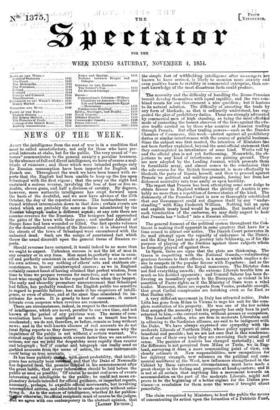"the necessity and the difficulty of handling the Russo-Prussian transit
develop themselves with equal rapidity, and the two coin- bined create fot"our Government a nice question ; but it hastens to its natural solution. The difficulty of- arresting the trade by any form of blockade, as that is ordinarily undetstood, has sug- gested the plan of prohibitory daties. These are strongly advocat by commereialmen of high standing, as being the most effect al mode of protecting the honest observer of the laws against the e sive traffic carried on by those who oonnive at Russian trading through Prussia. But other. trading powers—such as, the Dundee Chamber of Commerce, this week—protest against all prohibitory duties or similarinterferences with the course of gainful businees. Since the subject was first mooted, the intention of Ministers hias not been further explained, beyond the semi-official statement that they contemplated an interference of some kind. Weeks roll by and the official plan is not yet forthcoming. Meanwhile, the ob- jections to any kind of interference are gaining ground. They are now adopted by the Leading Journal, which presents them in formidable _array, and almost comes to the conclusion thht the sole course for the British Government is more effectually to blockade the ports of Russia herself, and then to proceed against Prtissbr /On political and military grounds, forcing her from;her dishonest neutrality into true amity or open hostility.
The report that Prussia has been attempting some new dodge to obtain. favour in England without the privity,of Austria is pro- bably no more than a repetition of former stories of the kind. The dishonestyy, of the Prussian Court is now so thoroughly established that, our Government .could not disgrace itself by any "
standing" with King Frederick William. Nothing but an op4n, and explicit treaty bond would he possible. .134 instead of any such termination of the emharrasi we may daily expect to hear that Prussia has " bolted" into a Russian alliance.
























